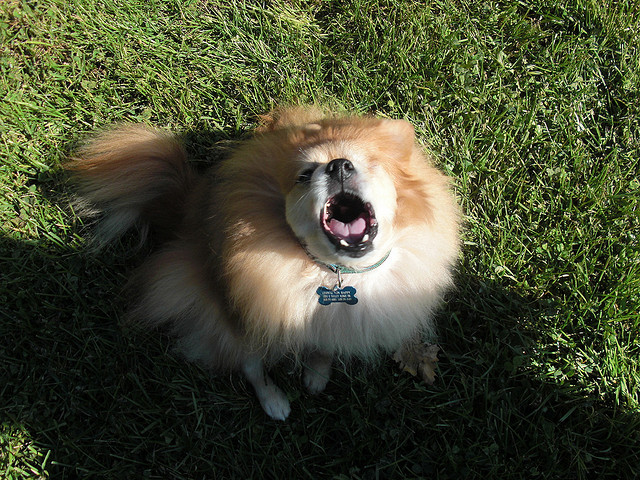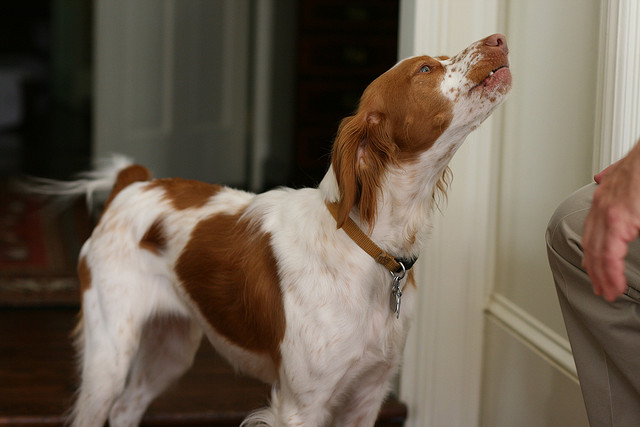Does your dog stand and bark at you when you ask them to do something?
Does he bark at you incessantly during training of a new behavior?
Does she bark at you if you don’t give her a treat after every potty break?
Does she bark at you if you don’t reward every behavior?
These are all examples of frustration barking – one of the most overlooked “barks” in a dog’s language. Many people mislabel it as “demand barking” (which dogs do as well) or think their dog is “just barking to bark.” However, frustration barking is actually a sign that there are problems in how you are communicating with your dog.
Robin Bennett, CPDT-KA is an expert on canine behavior and body language, author of All About Dog Daycare and co-author of Off Leash Dog Play and Knowing Dogs Staff Training. She reveals what can cause frustration barking and how you can work to stop it in your own dog.
What can cause frustration barking in dogs?
RB: There are several possibilities.
One is simply miscommunication between owner and dog. Just like us, dogs can get frustrated when they don’t feel like they are “being heard.” When pet parents don’t understand canine body language they can misread the dog, leading to frustration. When pet parents focus all their energy on “stopping behavior” [rather] than teaching appropriate behavior, it can also be frustrating to the dog. Imagine if you walked around with someone saying “don’t do that”, “don’t do that either,” “and don’t do that” but never telling you what you should be doing! That’s frustrating and dogs experience that sometimes.
Another possibility is that the dog is following a pattern that has worked in the past that now isn’t working anymore. For instance, if you typically give the dog a treat when he comes in the house and then you stop doing that, it’s possible the dog will think you have forgotten the proper protocol and may bark at you to let you know there is a problem. Unfortunately, if you respond to the bark, you reward the behavior, which leads to another common reason for frustration barking…because it works! As humans we usually respond to it by doing something with the dog and therefore reward the behavior.

One final reason is lack of exercise. The barking can become an energy outlet in the absence of any other mental of physical stimulation.
Why should owners be aware of frustration barking in their dogs?
RB: Because it usually indicates a lack of understanding between the dog and human. This is one of the strongest reasons to take a training class. Not only does it give you words that your dog learns and can respond to, but it helps both of you build a stronger relationship. Just like with any relationship, understanding one another reduces frustration. We expect dogs to understand what we want, but we should work just as hard to understand their behaviors. Training classes are a great way to learn this stuff. By working together you build a stronger, less frustrating relationship.
How do owners contribute (unknowingly) to their dog’s frustration?
RB: As mentioned above, we accidentally reward the barking at times. Lack of exercise and lack of understanding canine body language can all contribute to the problem. Combating frustration barking by yelling at the dog generally only serves to increase the dog’s frustration which then leads to more barking rather than less.
Are there some common mistakes people do to try and stop the barking that actually make it worse?
RB: Yelling at the dog will usually increase the dog’s frustration.
What are some ways to combat frustration barking?
RB: Make sure the dog has plenty of exercise each day (both mental and physical). As I mentioned, I would also take a training class with the dog to help you learn more about how to build a relationship together and commit to teaching the dogs what to do rather than focusing on “don’t do” options.

There is no one size fits all to managing barking. So experiment to see what works best for your dog.
Focus on your Reaction
The biggest part to all of this is that what you are doing is causing your dog to feel frustrated enough to get vocal. Whether you are trying to teach him something he does not get (one of the main times my own dog barks), changed the rules without informing the dog or don’t give him enough information to know how to react to a situation, it’s your doing. So when your dog starts to bark, think about the situation, what you were doing and what you should be doing instead to stop the reaction.
For example, if I am teaching my puppy something new and he doesn’t get (which means he is not getting rewarded), he will start barking after a while and stop trying to “guess” what he should do. This is when I need stop and change the way I am training, obviously he is not getting it. Better still, start recognizing signs that your dog is headed toward frustration before he starts to bark, so you can avoid that in your training and not accidentally reward him for it.

Another example is one that Bennett touches on above. If you always give your dog a treat for coming in the house, and suddenly you don’t, you have changed the rules without telling your dog. If you have never put him on a variable reinforcement schedule you need to build up to that in a training session. And above all – don’t cave and give him a treat while he is barking!
Frustration barking can be, well, frustrating. But if you work with your dog and pay attention to his body signals as well as how you are communicating with him, you can began to have a better, less frustrating relationship.
About the Author
Based in Wilsonville, Ore., animal lover Kristina N. Lotz is a Certified Professional Dog Trainer – Knowledge Assessed (CPDT-KA) and a member of the Dog Writers Association of America. She is the founder of A Fairytail House. In her spare time, she trains and competes in a variety of performance events with her Shetland Sheepdogs and caters to her two rescue kitties. She smartly married a Veterinary Technician, who helps keep the fur kids happy and healthy, and provides a quick resource for articles.

